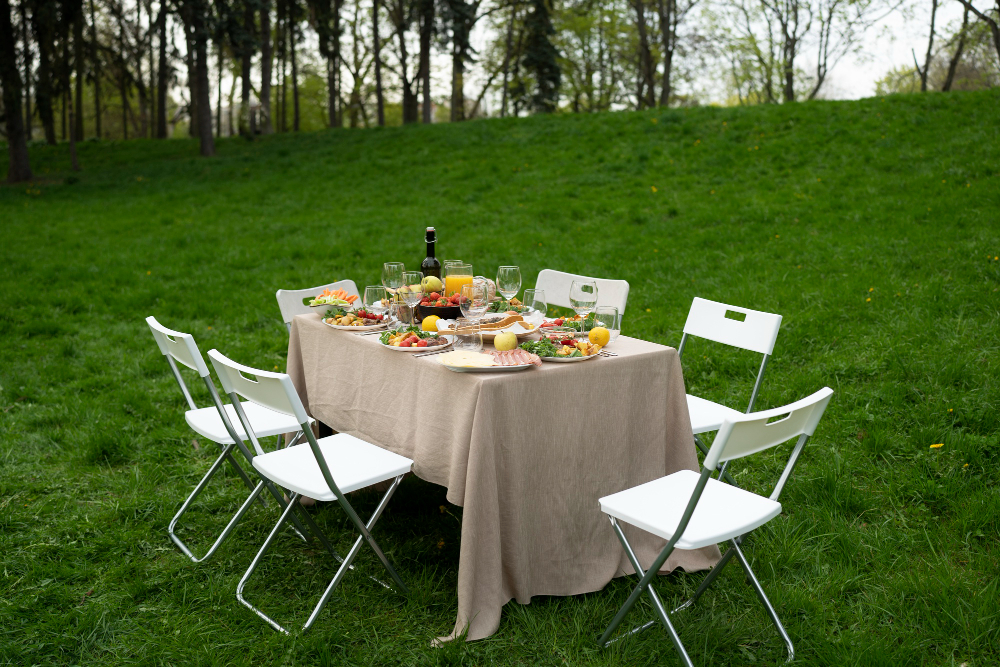Introduction: The Rise of Sustainable Events
In recent years, there’s been a growing awareness of the environmental impact of events, from weddings to corporate gatherings. The desire to minimize our carbon footprint has led to a surge in Sustainable Events, where eco-friendly practices are integrated into every aspect of planning and execution. This blog post will delve into the essentials of planning Sustainable Events, offering practical advice and inspiration for creating memorable, eco-conscious celebrations.
Understanding the Importance of Sustainable Events
The Environmental Impact of Traditional Events
Traditional events often come with a significant environmental cost. From excessive waste to high energy consumption, the typical event can leave a substantial carbon footprint. Understanding these impacts is the first step towards embracing Sustainable Events.
Why Choose Sustainable Events?
Choosing to plan a sustainable event is more than just a trend—it’s a responsible choice that reflects a commitment to the planet. By opting for eco-friendly practices, you can reduce waste, conserve resources, and create a positive impact that resonates with your guests and the environment.
Initial Planning: Setting Sustainable Goals
Defining Your Sustainable Event Vision
Before diving into the logistics, it’s essential to define what sustainability means for your event. Consider the scale of your event and the areas where you can make the most significant environmental impact.
Setting Clear, Achievable Goals
Set clear, achievable goals for your Sustainable Event. Whether it’s reducing waste by a specific percentage or sourcing all materials locally, having measurable objectives will guide your planning process and ensure your event stays on track.
Venue Selection: Eco-Friendly Options
Choosing a Green Venue
The venue is one of the most critical elements of a Sustainable Event. Look for venues that prioritize sustainability, such as those with LEED certification or eco-friendly practices like energy-efficient lighting, waste reduction programs, and water conservation measures.
Outdoor vs. Indoor Venues
Consider the pros and cons of outdoor versus indoor venues. Outdoor events can reduce the need for artificial lighting and climate control, but they may also require careful planning to minimize environmental disruption.
Sustainable Invitations and Communication
Digital Invitations: Reducing Paper Waste
One of the easiest ways to reduce waste is by opting for digital invitations. Not only do they eliminate the need for paper, but they also offer the convenience of instant RSVPs and updates.
If You Must Print: Eco-Friendly Materials
If printed invitations are a must, choose recycled paper or seed paper that can be planted afterward. Use eco-friendly inks and minimize packaging to further reduce waste.
Catering with a Conscience
Sourcing Local and Organic Ingredients
When planning the menu for your Sustainable Event, prioritize local and organic ingredients. This reduces the carbon footprint associated with transportation and supports local farmers who practice sustainable agriculture.
Plant-Based Menus: A Greener Choice
Consider offering a plant-based menu. Plant-based diets have a lower environmental impact, and they can be just as delicious and satisfying as traditional options.
Waste Reduction Strategies
The Three R’s: Reduce, Reuse, Recycle
Implement waste reduction strategies at your event by focusing on the three R’s. Reduce the amount of disposable items, reuse materials wherever possible, and ensure recycling bins are readily available for guests.
Composting and Food Donation
Set up composting stations for organic waste and arrange for leftover food to be donated to local shelters or food banks, further reducing waste and helping the community.
Eco-Friendly Decorations
Natural and Reusable Decorations
Opt for decorations made from natural materials like wood, fabric, or plants. Reusable items such as cloth napkins, table runners, and glassware can significantly reduce waste.
DIY and Upcycled Decor
Get creative with DIY and upcycled decor. Using items you already have or repurposing materials can add a unique touch to your event while being kind to the environment.
8. Sustainable Transportation Solutions
Encouraging Carpooling and Public Transit
Reduce the carbon footprint of your event by encouraging guests to carpool or use public transportation. Provide information on nearby transit options and consider offering shuttle services from central locations.
Biking and Walking: Healthy Alternatives
For local events, promote biking or walking as healthy, eco-friendly alternatives. Provide bike racks at the venue and ensure safe, accessible routes for pedestrians.
9. Ethical and Sustainable Vendors
Choosing Eco-Conscious Suppliers
Work with vendors who share your commitment to sustainability. From caterers to florists, choosing eco-conscious suppliers ensures that every aspect of your event aligns with your environmental values.
Vetting Vendor Practices
Ask potential vendors about their sustainability practices. Are they using locally sourced products? Do they minimize waste? Selecting the right partners is crucial to the success of your Sustainable Event.
10. Energy Efficiency at Your Event
Using Renewable Energy Sources
Power your event with renewable energy by choosing venues that use solar, wind, or hydropower. If that’s not an option, consider offsetting your event’s energy use by purchasing renewable energy credits.
Energy-Efficient Lighting and Equipment
Use energy-efficient lighting, such as LED bulbs, and choose equipment that consumes less power. This not only reduces your event’s environmental impact but can also lower costs.
11. Sustainable Event Favors
Eco-Friendly and Practical Gifts
Choose eco-friendly event favors that guests can actually use, such as reusable bags, bamboo utensils, or seed packets. These items not only reduce waste but also promote sustainable living long after the event is over.
Donations in Lieu of Gifts
Consider making a donation to an environmental charity on behalf of your guests instead of giving physical favors. This meaningful gesture reinforces the eco-conscious theme of your event.
12. Reducing Water Usage
Implementing Water Conservation Measures
If your event requires significant water usage, such as for catering or outdoor activities, implement conservation measures. Use water-efficient fixtures and minimize water waste through careful planning.
Offering Refillable Water Stations
Instead of providing single-use plastic water bottles, set up refillable water stations. Encourage guests to bring their own reusable bottles, further reducing plastic waste.
13. Sustainable Entertainment Options
Eco-Friendly Music and Entertainment
When planning entertainment, consider eco-friendly options like acoustic music performances or activities that don’t require electricity. This not only reduces energy consumption but also creates a unique and intimate atmosphere.
Interactive and Educational Activities
Incorporate interactive and educational activities that highlight sustainability, such as eco-friendly workshops or nature walks. These activities can enhance your event’s theme while educating guests on environmental issues.
14. Green Accommodations for Guests
Choosing Eco-Friendly Hotels
If your event involves overnight stays, recommend eco-friendly hotels that prioritize sustainability. Look for accommodations with certifications like Green Key or LEED.
Encouraging Sustainable Practices During Stays
Encourage guests to practice sustainability during their stay by reusing towels, turning off lights when not in use, and opting for low-impact activities.
15. Promoting Sustainable Events Through Marketing
Highlighting Your Event’s Eco-Friendly Features
When marketing your Sustainable Event, highlight the eco-friendly features and practices you’ve implemented. This not only attracts like-minded attendees but also raises awareness about the importance of sustainability.
Engaging Attendees in Sustainable Practices
Engage your attendees by providing information on how they can participate in the event’s sustainability efforts. From carpooling to recycling, small actions can make a big difference.
16. Measuring and Offsetting Carbon Footprint
Calculating Your Event’s Carbon Footprint
Use online tools to calculate your event’s carbon footprint. Understanding the environmental impact of your event allows you to take steps to mitigate it.
Offsetting Through Carbon Credits
Consider purchasing carbon credits to offset the emissions from your event. This can include contributions to reforestation projects, renewable energy initiatives, or other environmental programs.
17. Sustainable Event Planning Checklist
Creating a Detailed Sustainability Plan
Develop a comprehensive sustainability plan that outlines every aspect of your event, from waste reduction to energy use. This plan will serve as a roadmap for your Sustainable Event.
Regularly Reviewing and Adjusting Plans
As you plan your event, regularly review and adjust your sustainability plan to ensure it aligns with your goals. Flexibility and continuous improvement are key to success.
18. Educating and Engaging Attendees
Providing Sustainability Information to Guests
Educate your guests on the importance of sustainability and how they can contribute to the success of your Sustainable Event. Provide information through signage, handouts, or announcements.
Interactive Engagement Opportunities
Create opportunities for guests to engage with sustainability initiatives at your event. This could include hands-on workshops, discussions, or volunteer opportunities.
19. Post-Event Sustainability Review
Assessing the Success of Your Sustainable Event
After your event, conduct a sustainability review to assess what worked well and what could be improved. Gather feedback from attendees and vendors to inform future events.
Sharing Your Success Story
Share the success of your Sustainable Event with your community. Highlight the positive environmental impact and encourage others to adopt sustainable practices in their events.
20. The Future of Sustainable Events
Emerging Trends in Sustainable Event Planning
Stay informed about emerging trends in Sustainable Events. From virtual gatherings to innovative green technologies, the future of event planning is increasingly focused on sustainability.
Continuing the Journey Toward Sustainability
Remember, sustainability is an ongoing journey. Every event you plan is an opportunity to refine your approach, reduce your environmental impact, and inspire others to do the same.
Key Point 1: Defining Clear Sustainable Goals
Setting clear, measurable goals for your Sustainable Event is crucial. These goals guide your planning
process and ensure that every aspect of your event aligns with your commitment to sustainability.
Key Point 2: The Power of Local and Organic Choices
Choosing local and organic ingredients for your catering not only supports sustainable agriculture but also reduces the carbon footprint associated with transportation. It’s a win-win for your event and the environment.
Key Point 3: Reducing Waste Through Reuse and Recycling
Implementing the three R’s—Reduce, Reuse, Recycle—can significantly lower the environmental impact of your event. From decorations to waste management, these principles should be at the heart of your planning.
Key Point 4: The Importance of Educating Attendees
Educating your guests about the sustainability efforts at your event is essential. Engaged and informed attendees are more likely to participate in eco-friendly practices, amplifying the positive impact of your event.
Key Point 5: Measuring and Offsetting Your Carbon Footprint
Understanding and offsetting your event’s carbon footprint is a critical step in planning a truly sustainable event. This not only mitigates your environmental impact but also sets a standard for future events.
FAQs
- What is a Sustainable Event? A Sustainable Event is one that prioritizes eco-friendly practices, minimizing environmental impact through conscious choices in planning and execution.
- Why are Sustainable Events important? Sustainable Events reduce waste, conserve resources, and promote environmental awareness, helping to protect our planet for future generations.
- How can I make my event more sustainable? You can make your event more sustainable by choosing eco-friendly venues, sourcing local and organic food, reducing waste, and using renewable energy.
- What are some eco-friendly decoration ideas? Use natural materials, reusable items, and upcycled decor for an eco-friendly event. DIY decorations can also add a personal touch while reducing waste.
- Can a large event still be sustainable? Yes, large events can be sustainable by implementing comprehensive sustainability plans, engaging eco-conscious vendors, and encouraging attendee participation in green practices.
- How do I find sustainable vendors? Look for vendors with sustainability certifications or those who prioritize eco-friendly practices, such as using local products, minimizing waste, and reducing energy consumption.
- What are some examples of Sustainable Events? Examples of Sustainable Events include eco-friendly weddings, green corporate conferences, and zero-waste parties.
- How can I encourage my guests to be eco-conscious? Educate your guests on the importance of sustainability, provide information on how they can participate, and offer incentives for eco-friendly behavior.
- Is it expensive to plan a Sustainable Event? While some eco-friendly options may have higher upfront costs, Sustainable Events can be cost-effective by reducing waste, conserving energy, and avoiding disposable items.
- What should I include in a sustainability plan for my event? A sustainability plan should include goals for waste reduction, energy use, sourcing, transportation, and guest engagement. It should outline specific actions and metrics for success.



